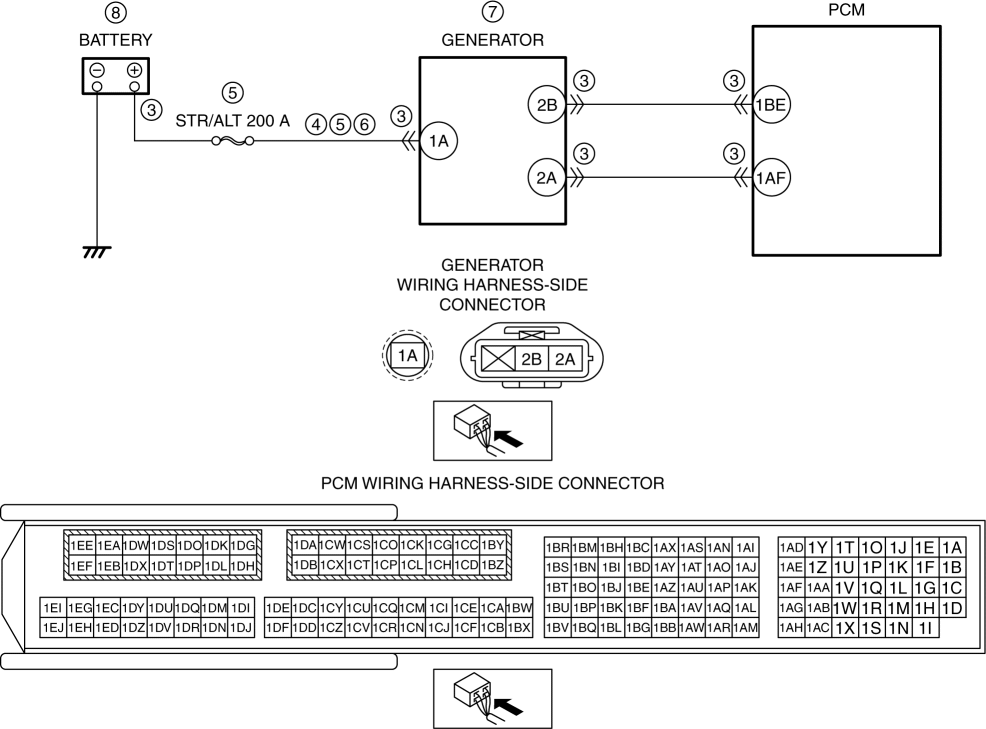DTC P2504:00 [PCM (SKYACTIV-G 2.0)]
NOTE:
To determine the malfunctioning part, proceed with the diagnostics from "Function Inspection Using M-MDS".
Details On DTCs
| DESCRIPTION |
Generator system: Voltage generated by generator is high |
|
| DETECTION CONDITION |
Determination conditions |
|
| Preconditions |
|
|
| Malfunction determination period |
|
|
| Drive cycle |
|
|
| Self test type |
|
|
| Sensor used |
|
|
| FAIL-SAFE FUNCTION |
|
|
| VEHICLE STATUS WHEN DTCs ARE OUTPUT |
|
|
| POSSIBLE CAUSE |
|
|
System Wiring Diagram
Function Explanation (DTC Detection Outline)
When the charge/discharge circuit for the power supplying the vehicle is normal, the vehicle will operate normally.
The PCM determines an over-charge malfunction by detecting that the generator terminal voltage or battery terminal voltage are abnormally high, and verification of vehicle malfunctions/safety assurance is performed.
Repeatability Verification Procedure
Clear the DTC from the PCM memory using the M-MDS. (See CLEARING DTC [PCM (SKYACTIV-G 2.0)].)
Start the engine.
Leave for 30 s while idling with no electrical load.
Leave for 30 s while idling with high electrical load.
PID Item/Simulation Item Used In Diagnosis
Not applicable
Function Inspection Using M-MDS
| STEP |
INSPECTION |
RESULTS |
ACTION |
| 1 |
PURPOSE: RECORD VEHICLE STATUS AT TIME OF DTC DETECTION TO UTILIZE WITH REPEATABILITY VERIFICATION NOTE:
|
??? |
Go to the troubleshooting procedure to perform the procedure from Step 1. |
Troubleshooting Diagnostic Procedure
Intention of troubleshooting procedure
Step 1???6
Perform an inspection of each signal transmission system.
Step 7
Perform a unit inspection of the generator.
Step 8???10
Verify that the primary malfunction is resolved and there are no other malfunctions.
| STEP |
INSPECTION |
RESULTS |
ACTION |
| 1 |
PURPOSE: VERIFY RELATED REPAIR INFORMATION AVAILABILITY
|
Yes |
Perform repair or diagnosis according to the available repair information.
|
| No |
Go to the next step. |
||
| 2 |
PURPOSE: VERIFY IF POOR CONNECTION OF EACH PART AFFECTS DIAGNOSTIC RESULTS
|
Yes |
Go to the next step. |
| No |
Connect each part or the connector correctly, then go to Step 8. |
||
| 3 |
PURPOSE: VERIFY IF CONNECTOR DAMAGE OF EACH PART AFFECTS DIAGNOSTIC RESULTS
|
Yes |
Repair or replace the connector and/or terminals, then go to Step 8. |
| No |
Go to the next step. |
||
| 4 |
PURPOSE: VERIFY IF SHORT TO POWER SUPPLY IN GENERATOR CHARGE/DISCHARGE CIRCUIT AFFECTS DIAGNOSTIC RESULTS
|
Yes |
Go to the next step. |
| No |
Refer to the wiring diagram and verify whether or not there is a common connector between battery positive terminal and generator terminal 1A.
Go to Step 8. |
||
| 5 |
PURPOSE: INSPECT FUSE
|
Yes |
If the fuse is blown:
If the fuse is damaged:
Go to Step 8. |
| No |
Reinstall the STR/ALT 200 A fuse, then go to the next step. |
||
| 6 |
PURPOSE: VERIFY IF OPEN CIRCUIT IN GENERATOR CHARGE/DISCHARGE CIRCUIT AFFECTS DIAGNOSTIC RESULTS
|
Yes |
Go to the next step. |
| No |
Refer to the wiring diagram and verify whether or not there is a common connector between battery positive terminal and generator terminal 1A.
Go to Step 8. |
||
| 7 |
PURPOSE: DETERMINE INTEGRITY OF GENERATOR
|
Yes |
Replace the generator, then go to the next step. |
| No |
Go to the next step. |
||
| 8 |
PURPOSE: VERIFY CONDITIONS OF BATTERY
|
??? |
Follow the inspection instructions, then go to the next step. |
| 9 |
PURPOSE: VERIFICATION OF VEHICLE REPAIR COMPLETION
|
Yes |
Repeat the inspection from Step 1.
Go to the next step. |
| No |
Go to the next step. |
||
| 10 |
PURPOSE: VERIFY IF THERE IS ANY OTHER MALFUNCTION
|
Yes |
Go to the applicable DTC inspection. |
| No |
DTC troubleshooting completed. |
